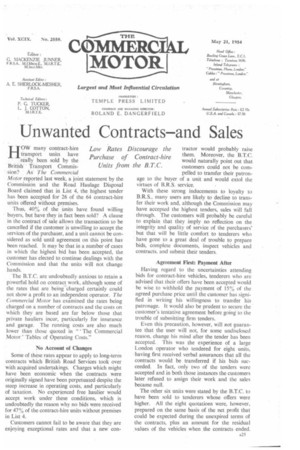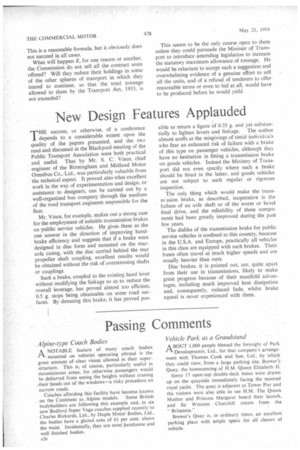Unwanted Contracts and Sales
Page 27

Page 28

If you've noticed an error in this article please click here to report it so we can fix it.
HOW many contract-hire transport units have really been sold by the British Transport Commission? As The Commercial Motor reported last week, a joint statement by the Commission and the Road Haulage Disposal Board claimed that in List 4, the highest tender has been accepted for 26 of the 64 contract-hire units offered without premises.
Thus, 40% of the units have found willing buyers, but have they in fact been sold? A clause in the contract of sale allows the transaction to be cancelled if the customer is unwilling to accept the services of the purchaser, and a unit cannot be considered as sold until agreement on this point has been reached. It may be that in a number of cases in which the highest bid has been accepted, the customer has elected to continue dealings with the Commission and that the units will not change hands.
The B.T.C. are undoubtedly anxious to retain a powerful hold on contract work, although some of the rates that are being chargedcertainly could not show a profit to an indeyendent operator. The Commercial Motor has examined the rates being charged on a number of contracts and the costs on which they are based are far below those that private hauliers incur, particularly for insurance and garage. The running costs are also much lower than those quoted in " ` The Commercial Motor' Tables of Operating Costs."
No Account of Changes Some of these rates appear to apply to long-term contracts which British Road Services took over with acquired undertakings. Charges which might have been economic when the contracts were originally signed have been perpetuated despite the steep increase in operating costs, and particularly of taxation. No experienced free haulier would accept work under these conditions, which is undoubtedly the reason why no bids were received for 47% of the contract-hire units without premises in List 4.
Customers cannot fail to be aware that they are enjoying exceptional rates and that a new con tractor would probably raise them. Moreover, the B.T.C. would naturally point out that customers could not be compelled to transfer their patronage to the buyer of a unit and would extol the virtues of B.R.S. service.
With these strong inducements to loyalty to B.R.S., many users are likely to decline to transfer their work and, although the Commission may have accepted the highest tenders, sales will fall through. The customers will probably be careful to explain that they imply no reflection on the integrity and quality of service of the purchasers' but that will be little comfort to tenderers who have gone to a great deal of trouble to prepare bids, complete documents, inspect vehicles and contracts, and submit their tenders.
Agreement First: Payment After Having regard to the uncertainties attending bids for contract-hire vehicles, tenderers who are advised that their offers have been accepted would be wise to withhold the payment of 15% of the agreed purchase price until the customer has signified in writing his willingness to transfer his patronage. It would also be prudent to secure the customer's tentative agreement before going to the trouble of submitting firm tenders.
Even this precaution, however, will not guarantee that the user will not, for some undisclosed reason, change his mind after the tender has been accepted. This was the experience of a large London operator who tendered for eight units, having first received verbal assurances that all the contracts would be transferred if his bids succeeded. In fact, only two of the tenders were accepted and in both those instances the customers later refused to assign their work and the sales became null.
The other six units were stated by the B.T.C. to have been sold to tenderers whose offers were higher. All the eight quotations were, however, prepared on the same basis of the net profit that could be expected during the unexpired terms of the contracts, plus an amount for the residual ,values of the vehicles when the contracts ended. This is a reasonable formula, but it obviously does not succeed in all cases.
What will happen if, for one reason or another, the Commission do not sell all the contract units offered? Will they reduce their holdings in some of the other spheres of transport in which they intend to continue, so that the total tonnage allowed to them by the Transport Act. 1953, is not exceeded? This seems to be the only course open to them unless they could persuade the Minister of Transport to introduce amending legislation to increase the statutory maximum allowance of tonnage. He would be reluctant to accept such a suggestion and overwhelming evidence of a genuine effort to sell all the units, and of a refusal of tenderers to offer reasonable terms or even to bid at all, would have to be produced before he would yield




















































































